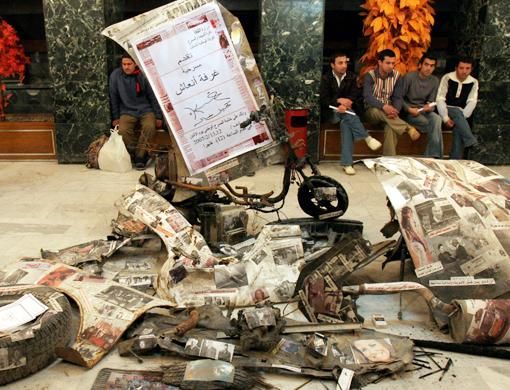Baghdad: Sa'ad Eskander is a slim, bespectacled man who wears corduroy jackets and has the quiet footfall of one who has spent many years in library reading rooms.
But, asked to name his biggest headaches as director of Iraq's National Library, Eskander's response is not one you would expect from a typical librarian: snipers and car bombs.
The National Library, whose rich collection of ancient Islamic texts was looted as invading US forces rumbled through Baghdad in 2003, sits on one of the most dangerous fault lines of the violence sweeping the capital.
Last month, Eskander evacuated his staff as US fighter jets roared over his two-storey building during a raging gunbattle with suspected Sunni Arab insurgents.
Five staff members have been killed in the last year and more than a dozen abducted by gunmen. Ageing librarians have taken medical leave after suffering heart problems made worse by blasts and machinegun fire shaking the reading and archive rooms.
The library is located between Haifa Street, one of Baghdad's most dangerous roads, and Shorja market, a frequent target of suicide bombers.
Before the invasion the library housed 1 million items, including centuries-old books and rare documents, part of the heritage of a city founded in the 8th century and the capital of the Abbasid Caliphate under Harun Al Rasheed, in whose time the One Thousand and One Nights tales were collected.
When the Mongols sacked the city in the 13th century, they dumped thousands of books into the river Tigris, whose waters legend says turned black with ink.
Manuscripts that survived the Mongol onslaught were stolen or destroyed during the chaos that engulfed Baghdad when US troops entered the city in April 2003.
90% of rare books looted
The library lost 90 per cent of its rare books to looters as Saddam Hussain's rule crumbled. Literary and religious texts of Iraq's once-thriving Jewish community, and records from the time of the Ottomans and the British-installed monarchy also disappeared.
Eskander blamed professional thieves working for overseas collectors for the loss of unique books, among them a treatise written about 1,000 years ago by Ibn Sina, an Islamic thinker whose works were studied for centuries at European universities.
"When you destroy a library you destroy an identity which in Iraq is in the process of taking root. Without a historical memory you cannot unify a country by force," he said.
"We are living not only in a security vacuum but also in a cultural vacuum," 44-year-old Eskander said.
"You cannot build the new Iraq without going back to the old Iraq."













